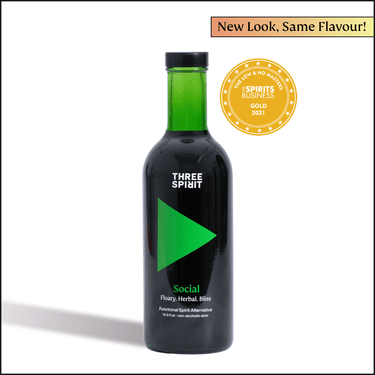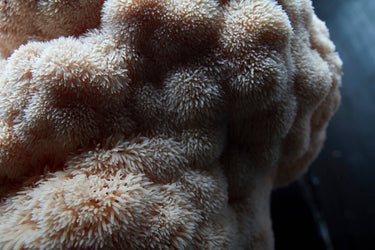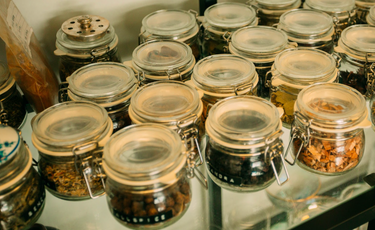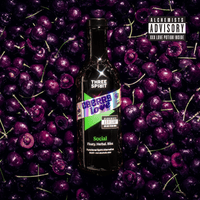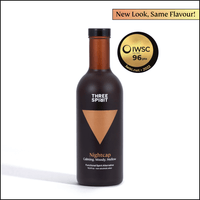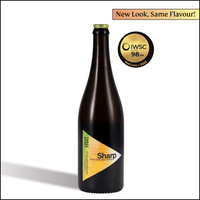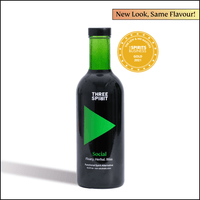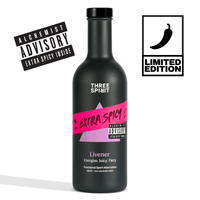What is a Lion's Mane mushroom?
Lion's Mane - also known as the 'pom-pom' mushroom due to their cute, fluffy appearance - is an edible mushroom belonging to the Hydnoid fungi group. It’s native to North America, Europe, and Asia and has been used in Asian cuisine and traditional medicine for centuries.
This delicious mushroom boasts a whole host of health benefits. It’s seen in multiple scientific trials to enhance cognitive function and reduce the effects of irritation and anxiety. Who doesn't want to think sharper, have better memory, be less stressed, and be generally more focused? This mushroom contains potent compounds that have been seen to protect your nervous system and have even been shown to reverse the effects of brain ageing and brain damage. Lion’s Mane is also an anti-inflammatory, and boasts compounds that are brilliant for gut health.
It’s important to note that wild Lion’s Mane mushrooms are very rare in the UK and it is illegal to harvest wild cultivations of the fungi; so if you stumble across a patch while out in the woods leave it be. You can however grow your own, or buy cultivated Lion's Mane at many good farmer's markets.
What does it taste like?
When cooked, Lion's Mane mushrooms are full of fresh marine notes similar to lobster or crab. When dried, it tastes rich, earthy and almost chocolatey in flavour and is rather different to its fresh counterpart. We use Lion's Mane in our Social in its dried form to bring lush jungle notes and deep umami complexity to the drink.
How do we grow it?
The Lion's Mane in our Social is grown on natural bedding before being dried for a deeper, earthier flavour. As it’s a slow growing mushroom, it is rather expensive, however we think it’s worth it for its potent mood, brain and body boosting abilities, as well as it’s great flavour.
Lion's Mane mushroom side effects
Despite its long use in history, no human studies have examined the potential side effects of the Lion’s Mane mushroom or its extract so it’s unclear whether there are any side effects after consuming it. There has, however, been an animal study conducted on rats where no adverse effects were recorded even at higher doses (2.3 grams per pound of body weight) per day for one month (55) (56) (57).
What do the scientists say?
1. Lion's Mane could reduce your risk of getting heart disease and stroke
Lion’s mane is good for your heart and circulatory system. It raises your metabolism and reduces the amount of triglycerides in the body. Lion's Mane mushroom has also been seen to prevent cholesterol from sticking to and narrowing your arteries - a key factor in many cardiovascular diseases. Herecinone B - a compound within Lion's Mane - has also been seen to reduce the risk of stroke in many scientific studies.
2. It’s a powerful antioxidant, protecting you from free radicals
Lion's Mane has one of the most powerful antioxidant properties of any edible mushroom, protecting the body from the damaging effects of everyday life. It contains potent compounds that mop up the damaging substances known as free radicals, that can contribute to premature aging and cellular damage. In lab experiments on human cancer cells, Lion's Mane has even been seen to effectively kill or slow the spread of several different cancer cells.
3. It’s good for your gut and boosts your immunity overall
Lion's Mane contains several compounds that have been shown to improve the immune system. It can also seriously improve gut health, and contains a class of compounds called beta-glucans that are great for your microbiome. One way this helps with immunity is by modifying the gut microbiome with a protein called HEP-3, which makes the gut much more resistant to infection.
Even better, Lion's Mane mushroom is immunomodulatory so it increases your immune system’s activity when you need it, and helps to reel it back if your body goes overboard - such as in the case of IBS.
4. It’s great for your brain
Lion's Mane is probably most famous as being a nootropic mushroom. This means that it contains compounds such as heracinines and eracinones that work as brain boosters! Lion's Mane mushroom has been seen in studies to speed up nervous system repair, decrease brain inflammation after brain injuries and to protect the brain from Alzheimer's disease, MS and dementia. In many studies, it has even been seen to reverse the effects of these conditions as well as reverse brain-aging.
Lion's Mane has even been observed to improve cognition, focus and memory in healthy test subjects - due to its capacity to produce a protein known as Nerve Growth Factor that allows the connections in the brain to grow and be repaired.
What’s more, as well as aiding cognition, Lion's Mane has been seen in several studies to be mood-boosting, reducing feelings of depression, anxiety and even reducing people's capacity for getting irritated. This mushroom really does have it all!
It’s great in our Social!
Lion's Mane - if you can get hold of it - is a delicious culinary delight! We use it in Social, and we’d recommend you give it a try in one of our cocktails!
You can also find Lion's Mane in a variety of other forms, in many good health food shops or your reputable Chinese medicine centre. We like tinctures for their ease of use, but you can find Lion's Mane in teas, tablets and even chocolate bars! If you’re looking for inspiration, take a look at our article on the best Lion’s Mane recipes and scroll on for some delicious alternatives.
How to try it…

Three Spirit Social - Drink your Lion's Mane in some awesome cocktails made with this curious bittersweet elixir - great mixed with tonic, ginger or soda.
Grown Neural Tonic - Add to tea or smoothies for a brain boost alongside other mushrooms, cacao and ashwagandha.
Indigo Herbs Lion's Mane Powder - Pure finest quality Lion's Mane.
Four Sigmatic Mushroom Chocolate - Because everyone loves chocolate right?
*It’s important to note that, if you are someone who is allergic or sensitive to mushrooms, it may be best to avoid Lion’s Mane. Why not try another of our Botanical Elixirs instead such as Livener?
*These statements have not been evaluated by the EFSA, MHRA or Food and Drug Administration however every care has been taken to use robust, peer reviewed academic papers. Our products are not intended to diagnose, treat, cure, or prevent any disease.



